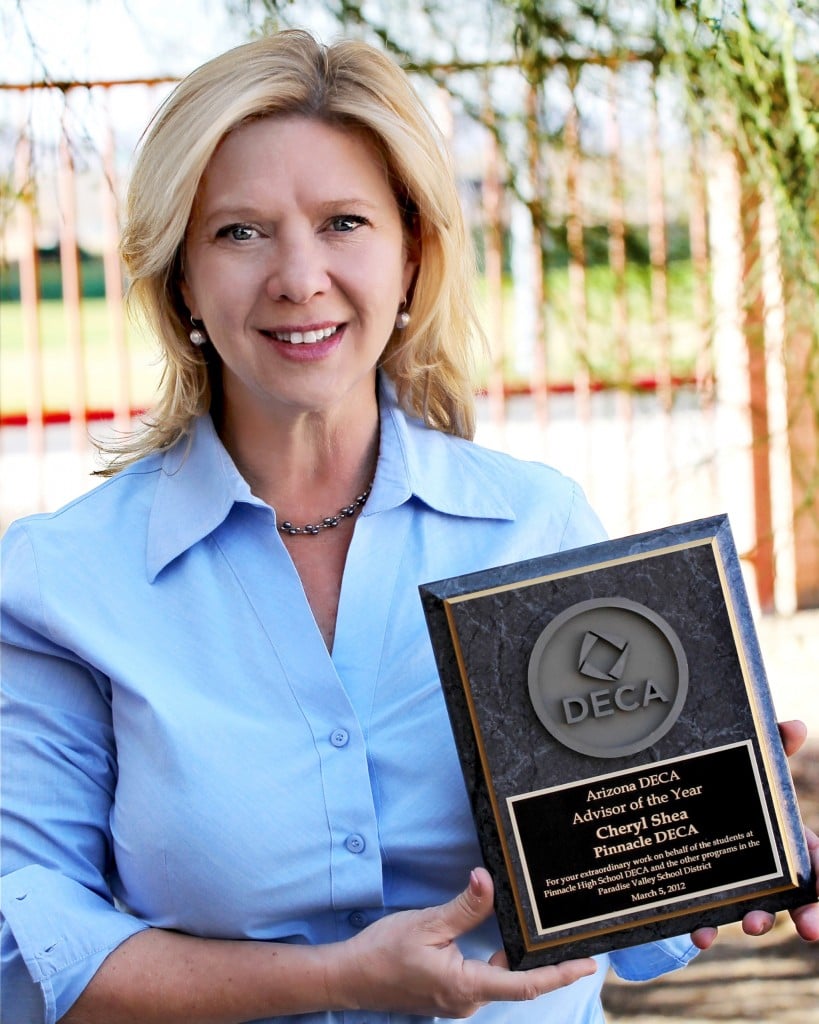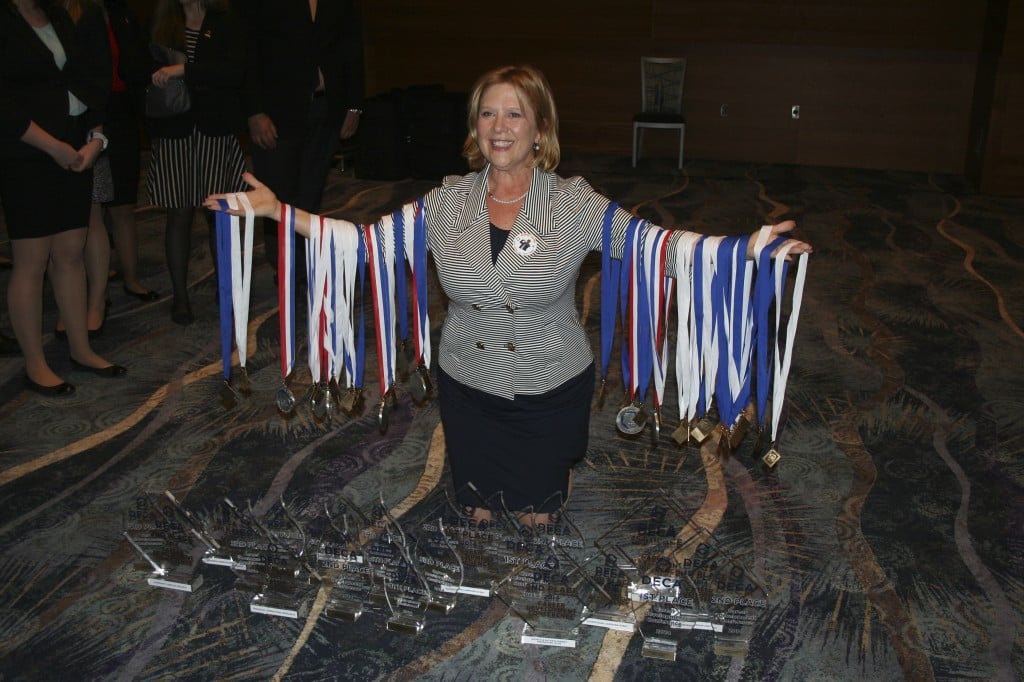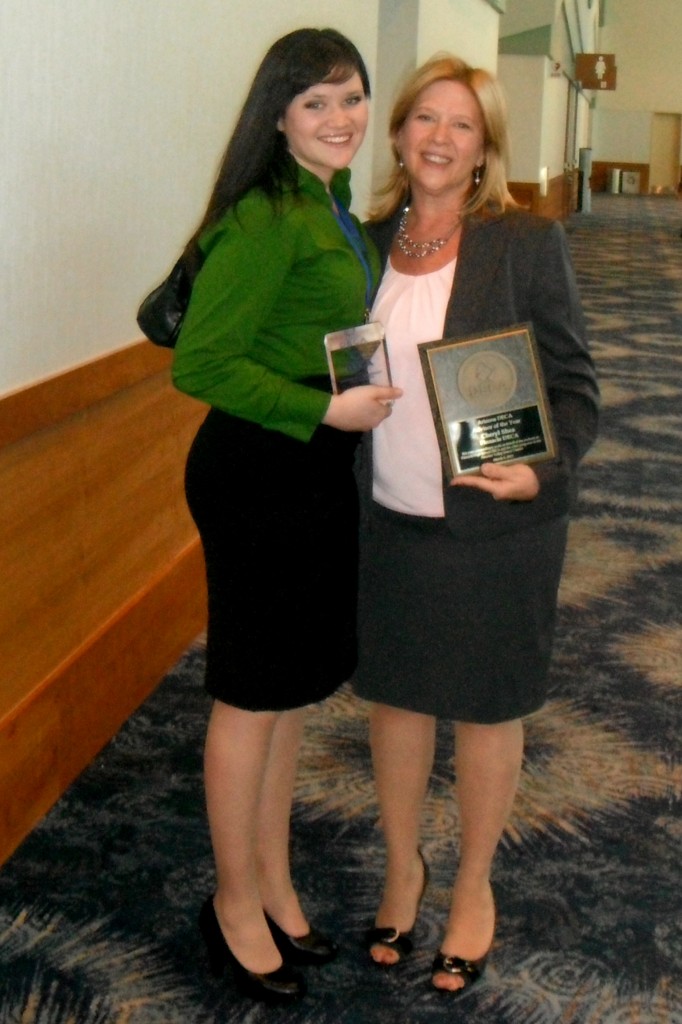We are excited to launch the first post of our Spotlight series, where we’ll talk with teachers who are making a difference in the field of economic education.
Our first feature is on Cheryl Shea, who teaches high school business, marketing, entrepreneurship, and financial literacy at Pinnacle High School in Phoenix, Arizona. She is affiliated with their local community college district, so her students are able to obtain Dual Enrollment college credit. Cheryl has also been a DECA advisor for seven years.
Here is what she said.
How long have you been teaching marketing/business? What do you love most about it?
Previously, I was in sales management but have just completed by tenth year as a second career teacher. I love the fact that I am able to impart my real-world expertise into my lesson plans. As a DECA advisor, advanced students that progress in my course sequence get to complete some very memorable written projects, such as extensive business plans, operation research and marketing proposals, advertising campaigns, etc.
Because I am an elective teacher, I have the opportunity and pleasure to work with some students through all four years of their high school experience. I get to see them truly mature, flourish, and become focused on what they want to accomplish beyond high school. Many times I am an active part of that process, creating an impact and making a difference.
Even better, I love how my former students who are now graduating from college (most are business majors) are staying in touch and as such, I am witnessing their successful entries into the workplace.
(Interview continues below the picture)
What are your biggest challenges in teaching marketing/business?
My greatest enjoyment is also my greatest challenge. As an elective subject, students choose to be in my classroom. They want to be there. If I don’t get students to register for my classes, I am out of a job. So I have to walk that fine line of being a fun subject to learn while remaining at the rigorous standards I set for the educational goals I have set for all my courses.
You’re currently serving on the SF Fed Educational Advisory Group (EAG). What kind of work have you participated in with your EAG colleagues?
This position has given me a unique opportunity to preview economic lesson plans that are being created for the classroom and test them out with my students. Of the activities I’ve participated in so far, I have been able to try the “flipped classroom” experience where my students watched a customized video at home, completed a worksheet and prepared questions to discuss the next day in class. It was a rewarding experience for all involved. I am implementing new practices and I know the students are enjoying the variety of activities in my classroom.
You’re also currently working on your Masters in Economics and Entrepreneurship for Educators (MAEEE) from the University of Delaware. Tell us about your coursework, why you decided to pursue this graduate degree, and your goals after completion.
I am always driven to challenge myself. This graduate program is unique in that it doesn’t just focus on the broad spectrum of education. I like that I am learning how to teach entrepreneurship through the lens of economics. I have been taking courses in macroeconomics, microeconomics, international trade and finance, money, banking and financial markets and, of course, the educational methodologies with which to teach these concepts most effectively.
I have had the opportunity to visit various economic think tanks in Washington D.C., the New York Stock Exchange, and participate in a number of Federal Reserve educational workshops.
The goals of the MAEEE and the EAG are very much aligned. They both want to strengthen the economic, entrepreneurial and financial literacy content of instruction in schools. Both believe in the “multiplier effect.” The more I share the knowledge I’ve gained with my colleagues, the more that I, hopefully, inspire others to tackle these challenges, creating a ripple effect as part of a network of educators exchanging meaningful economic, financial, and entrepreneurial education programs.
(Interview continues below the picture)
What has been your most impactful experience from last school year that involves your students and economics education?
Between the concepts I’m learning for my Master’s program, the support I’m receiving from the EAG, and another organization called the Foundation for Teaching Economics, I am accumulating resources for classroom practice, coaching, and enhancement of my students’ learning. An additional tool I have been using is a collection of computer simulation games. I love to have the students get involved with these engaging simulations in subjects such as stock market investing, personal finance, or entrepreneurship. The students work in cooperative groups using critical thinking skills applied to real-life scenarios. This is knowledge they will take with them far beyond high school.
What advice would you give you teachers (of any subject) who would like to insert more economics into their lessons but aren’t sure where to start?
Research the abundance of economic educational resources available out there, especially through FederalReserveEducation.org. Economics can be taught within all subjects but of course especially history, English, and math. If you are apprehensive about the subject, realize that you will learn so much by teaching it. I’ve heard it said that it takes three year of teaching to truly master a subject. Be patient and take it one step (or lesson or concept) at a time.
Thank you, Cheryl, for talking with us!



